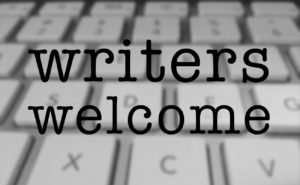 Yes, dear readers, it’s been a while since I posted–no excuses, just ordinary busy. I am, however, getting ready to be even busier, as I will, at last, be starting my thesis class later this month. When the class ends in December, I will (I hope) be awarded my M.A. in Fiction Writing, something I’ve been working steadily towards since 2005, when I entered my first M.A. program at DePaul University.
Yes, dear readers, it’s been a while since I posted–no excuses, just ordinary busy. I am, however, getting ready to be even busier, as I will, at last, be starting my thesis class later this month. When the class ends in December, I will (I hope) be awarded my M.A. in Fiction Writing, something I’ve been working steadily towards since 2005, when I entered my first M.A. program at DePaul University.
Big changes usually require a bit of looking back, and this one is no different. Many of you over the years have asked me what one actually does in an M.A. in Writing program, so I thought I’d share a few of the pieces I’ve written over the course of the program. I won’t share any fiction (that can bar it from being published by others later, and I don’t want to shoot myself in the foot). Instead, I’m just going to pass along a few of the academic papers I had to write that you might find illuminating, at least on the topic of what the hell I’ve been doing for the last eleven years.
The first one I’m sharing was the culminating paper for my Contemporary Authors course, the second course I took at Johns Hopkins. It’s part imitation of those authors’ styles, part general impressions of the course, and part analysis of what effect studying those authors might have had on my own writing. The original layout does not translate perfectly into a blog page, as it was intended to be read as a hard copy; I apologize in advance for that.
I won’t say “Enjoy,” even though I secretly hope you do. Be sure to read the footnotes; they matter.
Julia Tagliere
Contemporary Authors—Fall 2014
Paper 3
Who Do I Think I Am (as a Writer), Now?
All in.
Go big or go home.
Balls to the wall.
“Don’t be afraid to risk failure.”
Well, I’m here, aren’t I?
Wednesday
The fluorescent lights flutter pleasantly surprised eyelashes when we begin our Shit and Nonshit lists.
“DiazProustDidionChabon.”
“Oh, yes! PynchonWallaceUpdikeMailer!”
Round-robin to me. “Well…I always liked Fun with Dick and Jane?”
Disgruntled Easter Island Heads dismiss me.
Wednesday
Prof. B. glows in the blue light of the projector that projects nothing. “I am the Great and Powerful Oz,” he says, impishly waiting for the rest of us to get it.
“But what about the curtain?” I ask.
“There is no curtain,” Easter Island Heads chant.
WEDNESDAY
“So the mimesisaporiatexturearc fulfills our kinesis subtextually, no?” Prof B. grins.
“Exactly,” the Easter Island heads coo in chorus, anticipating the question crouching ashamed in my throat.
The 8:15 alarm gnashes its little fangs again. No one is glowing anymore but especially me. My minutes in this class are numbered.
[Johnson, Wolff]
And now for a little background music:
When MD[1] was a very little girl, she thought she could unzip the scar on the back of her head[2] in order to retrieve the stories hidden therein. Her mother told her that Dr. Manno[3] inserted a piece of Saran Wrap inside her skull to prevent “future ossification of the fibrous sutures,” but MD, clever little girl that she was, recognized a gross oversimplification when she heard one. She chose instead to believe that all the possible stories of the universe had been imprinted on an infinite scroll inside her head. Thus began MD’s lifelong obsession: The Retrieval Project. [Appendix 1, MD’s “Johns Hopkins Purpose Statement,” available upon request. Please send an SASE.]

[MD, post-surgery.]

[MD awakens, plotting.][4]
Fruitless attempts followed, beginning at age eleven with a ghastly poem[5] about her mother’s impending death sixteen years later, but more often than not, life [see Timeline 1] rather than writing intruded.[6]

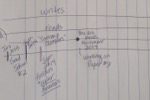
[Timeline 1, In honorem Carson]
But finally, one day she published an article in a national writing magazine, and then a short story, and then a novel, and then a second novel, and then she was featured in another magazine, and thus captured the attention of a Very Important Agent who blessed her work and decreed that all MD had to do for the rest of her life was keep unzipping that zipper.[7]
Or, maybe MD did give up, and for very long periods of time.
It’s also possible that what really happened was that she never gave up on resuming the quest.
[Johnson, Galchen, Wolff, Carson, Foster Wallace]
Whew. I’m glad that’s over.
What I attempted to do with the preceding pages is not only provide a sense of the writer persona I brought to class, but also to demonstrate that I can at least imitate some of the stylistic and structural techniques employed by the authors we’ve been studying this semester. I did this to show that I recognize how those techniques can heighten the experience of even humdrum and ordinary narratives (such as mine), as well as impose upon the reader a very contemporary-feeling level of interactivity.
But while I am able to mimic some of those techniques, and hopefully some of their desired effects, I don’t necessarily feel that they are my way, either as a writer or as a reader. You see, while I fully appreciate that these authors we’ve studied are bringing a new set of tools to my toolbox, I don’t know how many of them apply to the works to which I am drawn, either as a reader or as a writer.
You said in class this week that there are people who “luxuriate in the possibility of multiple meanings” and there are people who don’t. As a reader, I definitely fall into the latter category. I have a conventional taste, a taste for works that don’t leave me hanging, that don’t force me to read a line a dozen times over and still not understand what happened. I prefer works that are more plot- and character-driven to those that play games of time and consciousness on the reader, and find myself incredibly frustrated by unresolved endings. I don’t believe in a consistently happy ending (how dull) but I do believe in an ending, not the feeling that the author has deliberately stopped the story short of resolution and left the rest up to me. Because I prefer reading those works, I also end up writing those types of works myself.
When we first started reading Wolff, I disliked him, because I didn’t know “what happened” at the end of his stories. Our in-class discussions about why we don’t know with any certainty (that what happened is not necessarily the point) definitely helped alleviate my discomfort and led to a greater appreciation, but still, I would not choose to go back and read Wolff for enjoyment—it’s not to my taste to go without some stronger sense of resolution.
I don’t feel I need to dwell much more on Wallace and Johnson’s works, given that I wrote my first two papers on them, except to say that I think it’s obvious that I greatly prefer Johnson’s nonfiction to his fiction. While I appreciated the fiction techniques he used, I didn’t find them enjoyable—the sensation of never quite understanding what’s going on, of never quite being sure what is real and what is imagined, is discomfiting for me.
You can imagine then, that I found Atmospheric Disturbances unpleasant and perhaps even irritating (and you would not be mistaken, for reasons I have already mentioned in class but which include her “smashing the fourth wall” and messing around with confusing and alternate realities); and while I was prepared to be thoroughly aggravated by Nox, to be honest, I found myself (unwillingly, maybe) pleasantly compelled. I’m still not sure how I feel about a work of this nature being mass-produced[8] but found myself drawn into her attempts to solve the mystery of her brother, occasionally amused by unexpected glimpses of humor, and moved by her lovely language. But am I chomping at the bit to go read more of her work? Absolutely not.
So to recap, of the authors we’ve read, to this point, I have not fully engaged with any one of them other than Foster Wallace and (very grudgingly) Johnson’s Seek.
Then I start reading Stoner.
Right from the first page, I connect with the characters, the setting, the plot—it feels like coming home to a warm blanket and a cup of cocoa after fighting my way through the storms of all those other “challenging” works. Williams is not throwing obstacles of time and place and character mindfucks[9] at me left and right à la Johnson (fiction); he’s not inserting himself in the story in a distracting and irritating fashion à la Galchen; he’s not giving me a blank page and assuming that I will enjoy being asked as a reader to imagine what’s on it à la Carson. He does none of the things that I found so challenging about the other authors, and that very inaction, for lack of a better word, produces in me a profound contentment as I read. And I know, from Williams’ own words, exactly why: It’s contained in the interview at the beginning of Stoner, where Williams addresses the (apparently contemporary) movement of turning stories into “something to be studied and understood rather than experienced…as if [they] were a kind of puzzle.” His quote, “My God, to read without joy is stupid,” (xiii) sums up my whole disconnect perfectly.
These other authors we’ve read produced a number of effects on me as a reader, but I can honestly say I would not describe any of them as joy, and that is The Big Barrier standing between not just me and these authors, but also between me and the moniker of “Contemporary Author,” if the term is to be defined by works such as these.
Many of the pieces we read (in particular, Atmospheric Disturbances and Jesus’ Son) struck me as more about reader manipulation than about producing joy in the reader by the telling of a good story, and the sense I was getting in class that some out there may consider Williams overly conventional, dull, and worthy of fading away, saddens me.
Perhaps the joy I felt was magnified by Williams’ juxtaposition with those other, “more-challenging” authors. Would I have found Stoner as enjoyable if I hadn’t just fought my way through Galchen and Carson? There’s no way of knowing for sure, but I think the answer, based on past experiences, may well be yes.
I can’t speak for any joy produced in others by my own writing, but I think it’s safe to say that overt reader manipulation usually[10] takes a pretty comfy back seat to plot and character—well, maybe not comfy, hardly more than a rumble seat, really. But it’s also safe to say that, having read these works and seen how highly acclaimed they are, as well as having something I enjoyed reading be dismissed by others in class, unnerves me, makes me question my own writing. A sample of what me, myself, and I are asking each other:
- Am I too conventional, too prosaic, a throwback, a literary Luddite, because I dislike these authors and their works?
- What tools from those we’ve studied can I, or would I, apply to my own writing that might help expand on deeper themes and meaning without veering into that deep space of blatant reader manipulation that I dislike so much myself as a reader?
- If this is what the “literary world” (publishers, readers, agents, etc.) is looking for when they say things like “conceptually dazzling,” “original,” or “unique,” if I don’t adapt, is there, then, still a place for a writer like me? Or am I marked for obscurity, doomed to fade away as you seemed to predict Stoner will, before I ever truly begin?
- If there isn’t a place in the world of Contemporary Authors for me, do I even give a rat’s ass? Or will I continue to read and attempt to write those things that give me, and hopefully my readers, joy?
Wow, that is some conversation we’re having. But don’t lose heart, for, after belching out all of these questions, the three of us decide to take a look at my bookshelves and we see not Carson, not Johnson, and certainly not Galchen, but Tan, Patchett, Gaiman, Martin (George R.R.), Hosseini, and others, and we realize that there are thousands of writers out there creating engaging, compelling stories—stories that are a joy to read; stories that one doesn’t have to solve like a puzzle in order to understand; stories that honor that vital contract[11] between writer and reader, the one that says, in part (at least in my version):
- I will provide the transportation for this journey. All you have to do is fasten your seatbelt, put your head back against the seat, and relax. I am in charge, but I won’t abuse my awesome power.
- I will try not to confuse you.
- I will do my utmost to keep my personal shit to myself. You didn’t open this book to learn about me. If you did, you’re in the wrong section of the bookstore—biographies are in the back.
- I will not ask you to provide the ending for me. That’s my job.
- I will endeavor to keep you engaged and wanting to turn the next page and the next page and the next page until there are no more pages to turn, then I will write “The End” and I will mean it, because I know if I bore you, piss you off, or betray you, you will leave, never to return again.
So, this is my answer to the question “Who do I think I am, Now?” after finishing this class. Hopefully, it’s illuminated some of my thought and growth processes this semester, illustrated that I was paying attention in class, and etched another sloppy hash mark onto my timeline-in-progress.
On the other hand, maybe the preceding pages are just the Carsonesque artifacts of another graduate student who panicked at topic level and is just trying to bullshit her way through a paper in any way she can.
Well?
[Wolff, Carson, Galchen]
[1] “Middle Daughter” or “Motherless Daughter.” Abbreviating periods omitted to distinguish from Medical Doctor.
[2] May or may not have resulted from craniotomy, a treatment for craniosynostosis.
[3] MD’s pediatric neurosurgeon
[4] Two can play this game, Ms. Galchen.
[5] “Mommy:” “Mommy, will you bounce me on your leg? /Mommy, will you fry me an egg?”
[6] Timeline explained: x (MD) wanted y (to release her stories) in the worst possible way and, in Wolff-like fashion, surmounted a number of obstacles on her quest to do so [Appendix 1], obstacles that ultimately result in her sitting in a Contemporary Authors class in Fall 2014, bashing her brains out against an impenetrable wall of challenging works and wondering if the scroll of stories beneath her zippered skull are truly stories that can ever be written—should be written—or if all along those “guided dreams” were just some propofol-soaked surgical waste that Dr. Manno bobbled, dropped, forgot, and zipped into her brain along with the scrap of plastic and perhaps a blood-soaked sponge.
[7] Some of these things actually happened.
[8] Okay, no, that’s a lie; I know exactly how I feel. Really? Blank pages? Dictionary entries? Photos so blurry you can’t make out an image at all? How is this worthy?
[9] A tiny nod here—(a chin bob, really) to Johnsonian profanity, as well as being one of my favorite and most precise Carlinisms.
[10] Okay, I’ll grant that there is some limited mindfucking that goes on in some of my pieces, but it tends to be around plot twists rather than around technique or skewed subjectivity. You might be surprised by a turn or a development, but in order to understand it, you won’t first have to do the literary equivalent of finding The One Correct Puzzle Piece in a Chinese puzzle box containing a thousand identical pieces while blindfolded in a dark room on a pitching ship on a horizonless sea without a compass and fighting the worst bout of seasickness you’ve ever had. (Yeah, that’s kind of how I felt while I was reading Galchen. I didn’t like it.)
[11] For works of fiction only; we require a completely different contract for nonfiction.
 visible core “basket of deplorables” (his white supremacist, misogynistic, anti-immigrant, shit heap of a base), the folks who pushed Trump over the finish line were deeply ashamed of voting for him, but saw no other viable option. (Come on, HRC voters—did all of you feel you saw one, truly?)
visible core “basket of deplorables” (his white supremacist, misogynistic, anti-immigrant, shit heap of a base), the folks who pushed Trump over the finish line were deeply ashamed of voting for him, but saw no other viable option. (Come on, HRC voters—did all of you feel you saw one, truly?)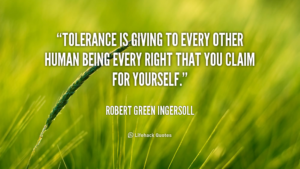 So what do we do now, with all this desperation on both sides? Can we find a way to turn to each other and say, I know you’re suffering, brother, what can I do to help? Can we find a way, sister, that will lift us all up? Not only to build up those who feel the firm ground of American potential has crumbled beneath their feet, but also, to build an unbreakable wall (YES! I said build a damned wall!) of loving service and tolerance and compassion, not at any of our borders, but between our vulnerable, terrified brothers and sisters—women, minorities, immigrants, LGBTQ, Muslims—and the hateful agenda of Trump’s reprehensible base? I believe that we can. What’s more, I believe that now, we must.
So what do we do now, with all this desperation on both sides? Can we find a way to turn to each other and say, I know you’re suffering, brother, what can I do to help? Can we find a way, sister, that will lift us all up? Not only to build up those who feel the firm ground of American potential has crumbled beneath their feet, but also, to build an unbreakable wall (YES! I said build a damned wall!) of loving service and tolerance and compassion, not at any of our borders, but between our vulnerable, terrified brothers and sisters—women, minorities, immigrants, LGBTQ, Muslims—and the hateful agenda of Trump’s reprehensible base? I believe that we can. What’s more, I believe that now, we must.
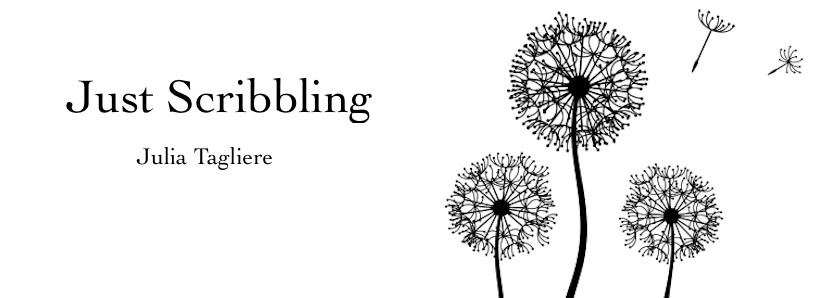
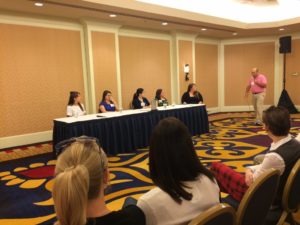 Last week, I attended my second Chesapeake Writing Workshop in Arlington, VA. Our speaker was
Last week, I attended my second Chesapeake Writing Workshop in Arlington, VA. Our speaker was 
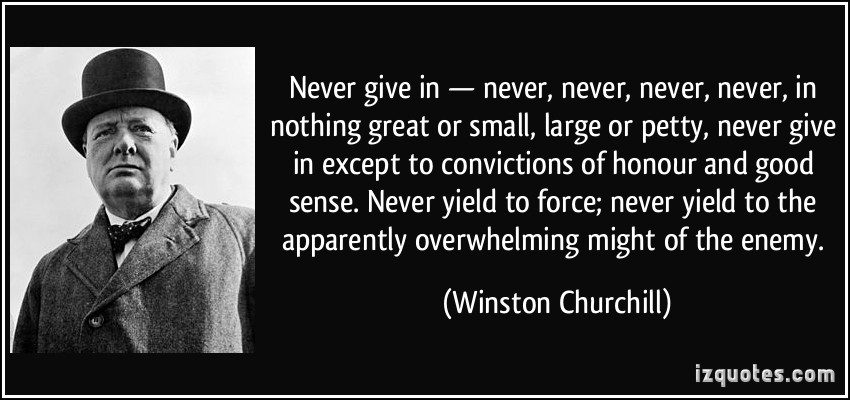
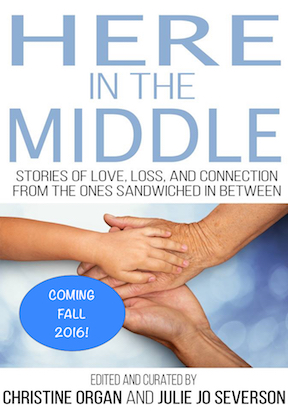
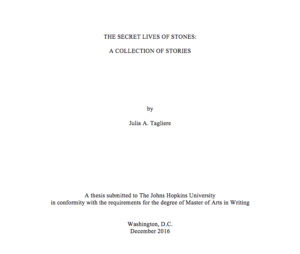 Well, it’s official: I’ve submitted the first draft of my thesis for review, and the process was just as much of a pain in the ass as I’d heard it would be.
Well, it’s official: I’ve submitted the first draft of my thesis for review, and the process was just as much of a pain in the ass as I’d heard it would be.
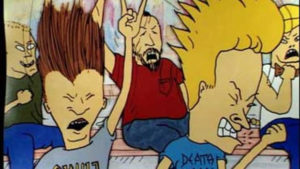
 Yes, dear readers, it’s been a while since I posted–no excuses, just ordinary busy. I am, however, getting ready to be even busier, as I will, at last, be starting my thesis class later this month. When the class ends in December, I will (I hope) be awarded my M.A. in Fiction Writing, something I’ve been working steadily towards since 2005, when I entered my first M.A. program at
Yes, dear readers, it’s been a while since I posted–no excuses, just ordinary busy. I am, however, getting ready to be even busier, as I will, at last, be starting my thesis class later this month. When the class ends in December, I will (I hope) be awarded my M.A. in Fiction Writing, something I’ve been working steadily towards since 2005, when I entered my first M.A. program at 



 k all over my desk are any indicator, I’ve ditched my white board lists completely (sorry, all you fuchsia trees out there); and I’ve been pretty successful at that “live in the moment” attitude.
k all over my desk are any indicator, I’ve ditched my white board lists completely (sorry, all you fuchsia trees out there); and I’ve been pretty successful at that “live in the moment” attitude.